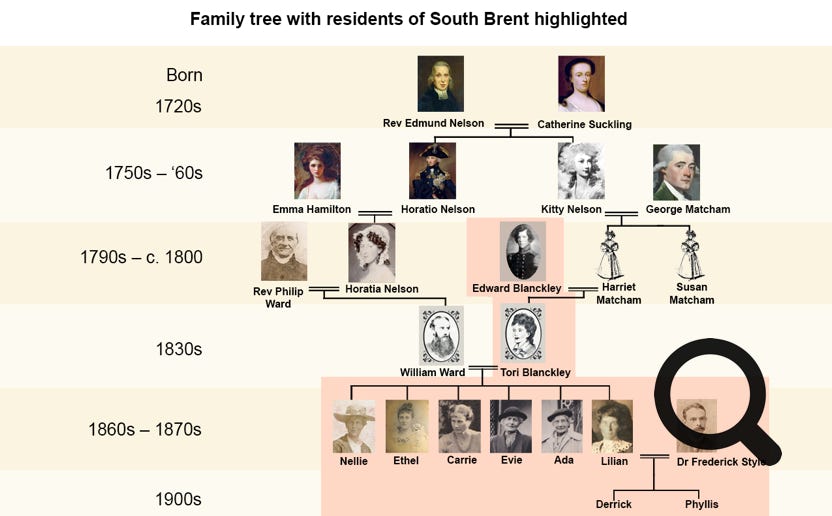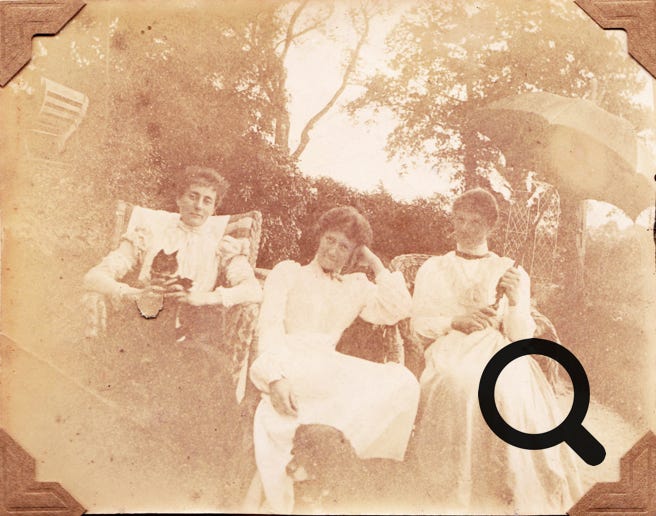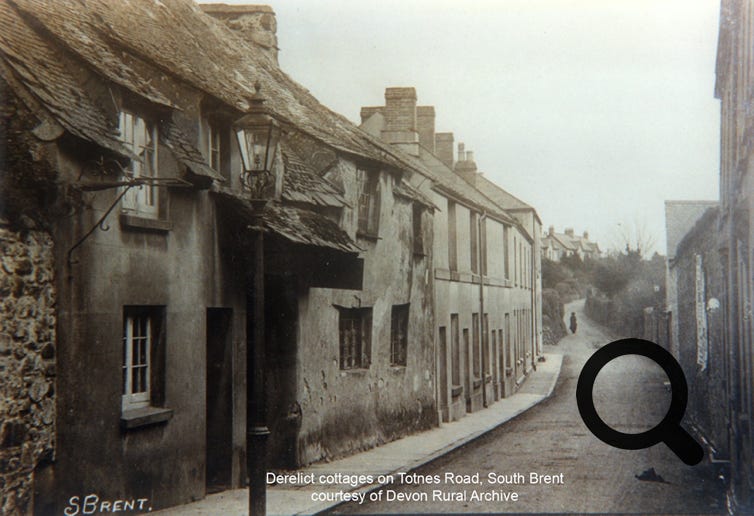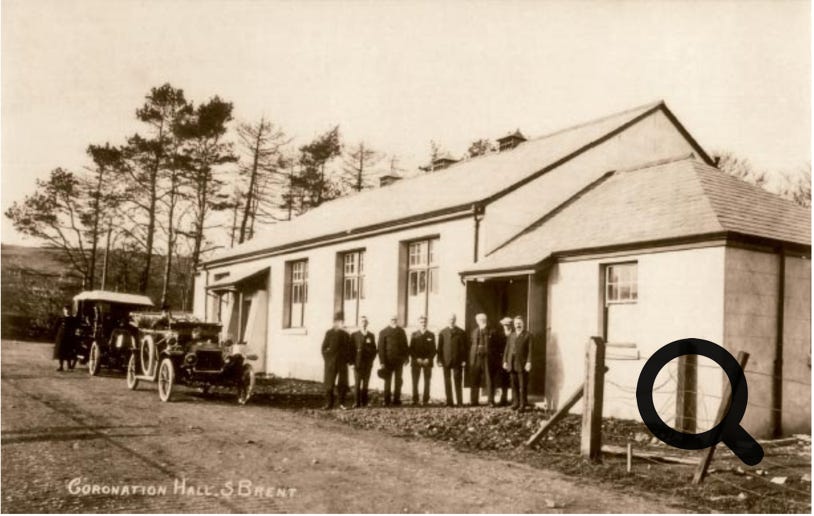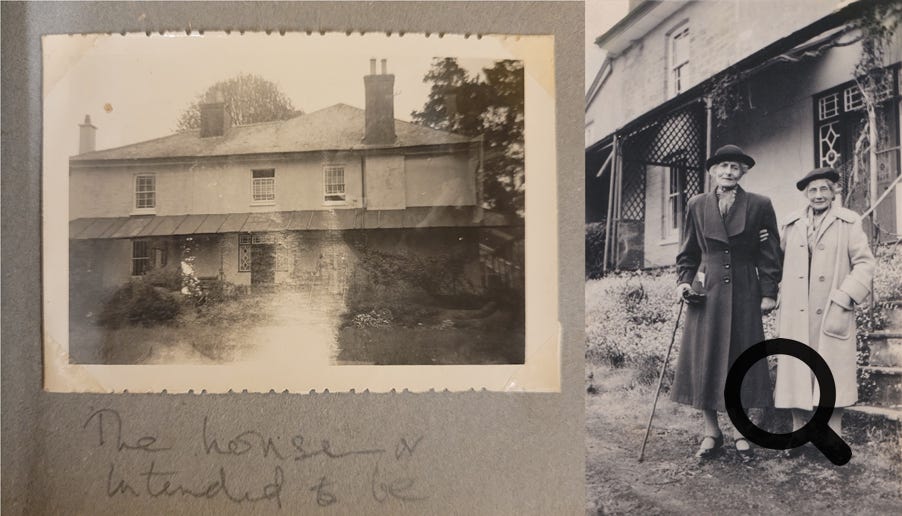Lily Style Author
Nelson’s Descendants in South Brent
(first published in Ivybridge iMag in December 2022)
In the late 1880s a middle-aged widow, Tori Ward, settled in Lutton, South Brent, with her six young daughters. Tori was born in Plymouth in 1835 in Union Road – now Union Street – which was then a fashionable new-build for well-to-do naval officers. She was the granddaughter of Lord Nelson’s sister, Kitty Matcham. Her husband, William Ward, had been her cousin because he’d been the son of Lord Nelson’s only child, Horatia.
Tori’s father, Captain Edward Blanckley, had returned from a tour of South America with a lingering tropical illness and a big payoff for capturing illegal slave ships. He’d bought and renovated a house on Brent Hill, overlooking South Brent, likely as a healthful, clean-air retreat. He’s listed as its owner occupier in the 1838 tithe map. Tori’s mother, Harriet, died of childbed fever in their Plymouth home when Tori was three. Tori and her baby brother were adopted by Harriet’s widowed sister, Susan Montgomery Moore. The younger of Susan’s two children died of typhus in January 1839, and Tori’s six month old brother died a few weeks later. Susan retreated after this string of tragedies and raised Tori in social isolation.
Tori married late in life by Victorian standards, being twenty-nine when she married her cousin, William Ward. He took her to his military posting in India. She bore him five daughters there between 1865 and 1871. In 1872, they returned to England and settled near William’s widowed mother, Horatia, in Pinner, north-west of London. Their last child, Lilian, was born there in 1873. William, chronically ill with liver illness, died during extended home leave five years later. Tori fled Pinner to her aunt, Susan, on the other side of London. When Susan died in 1885, Tori’s childhood model of retreating after tragedy seems to have spurred her to move her daughters to Lutton House, the place her father had bought in South Brent. They were well-established there by July 1891 when two of her girls performed in ‘an interesting entertainment’ arranged by the vicar.
Tori’s daughters were actively concerned for animal welfare. Totnes Weekly Times’s October 1893 report of prosecutions of animal abusers at South Brent fair noted, “Miss Ethel Ward, of South Brent, deposed she complained to the Inspector of the cruel beating of ponies.”
When my mum spent her school holidays at Lutton House in the 1950s, the surviving sisters, Evie and Ada, had an anti-vivisection leaflet pinned up in the bathroom and were vegetarians (although they ate chicken). They kept chickens in repurposed “cat houses” – large outdoor hutches – which had presumably been erected to accommodate some of the nine, highly-territorial cats my mum was told they’d kept. Ada boiled up vegetable peelings every evening to make hen-food. If it was bad weather, Ada donned an ancient Victorian bonnet when she went out to feed them.
Tori, for her part, was driven by concern for the well-being of South Brent’s poorer residents. In those pre-NHS days, good health-care was hard to access for people on low incomes. Dr Parson's 1881 report of the prevalence of typhoid fever in South Brent reveals living conditions to have been very unsanitary:
Privy accommodation is scanty… the women using utensils in the house, and throwing the contents of them on dung heaps… A number of cases of typhoid fever occurred in 1877, in a group of wretched cottages in Fore Street, and behind the “ Anchor ” inn…
Tori teamed up with seven fellow residents, including the village’s first GP, Dr Frederick Style, to form South Brent Nursing Association in October 1901. The nursing association provided free health care for the poor. In addition to this, Dr Style directed Tori’s daughters to deliver beef tea to sickly Brentonians on low incomes.
In 1903, Dr Style married Tori’s youngest, Lilian, the only one of her daughters to marry. The couple were wed in South Brent’s St Petroc’s church. Exeter and Plymouth Gazette’s report of their wedding describes Lilian as “a member of a family who has always shown a keen interest in the poor.”
Dr Style was part of the committee behind South Brent’s present-day village hall, which opened in February 1912.
Three of Nelson’s great-granddaughters c. 1903. Most likely Ethel, Ada and Lilian.
